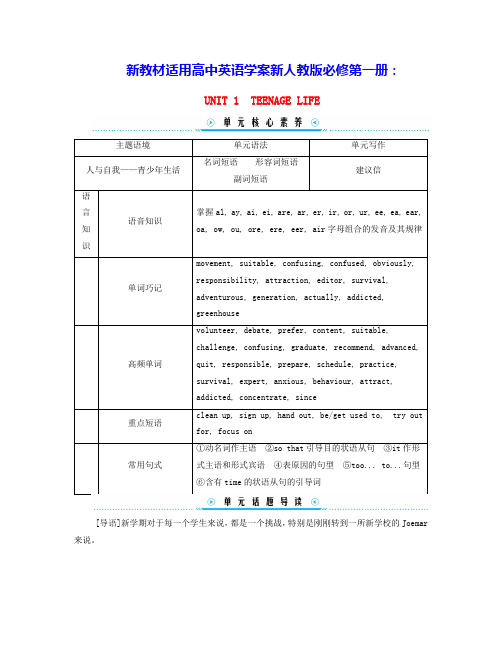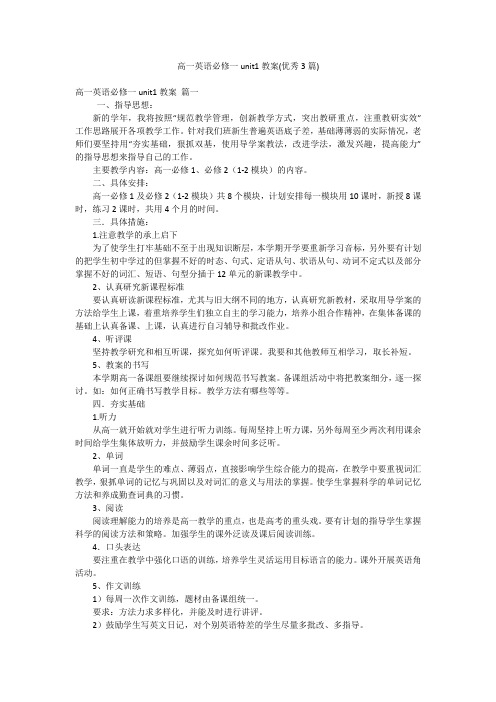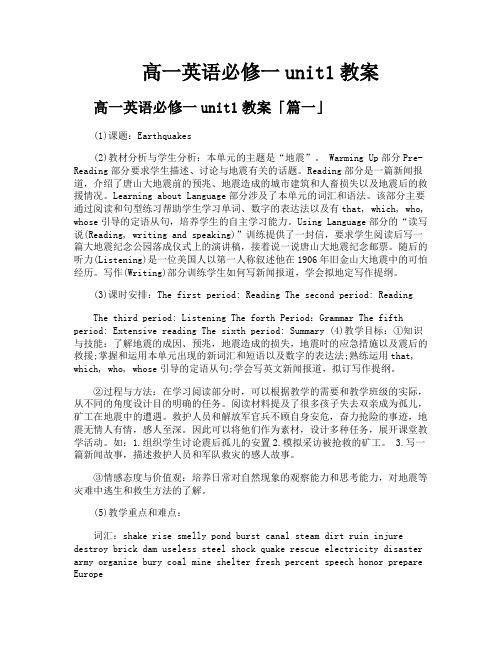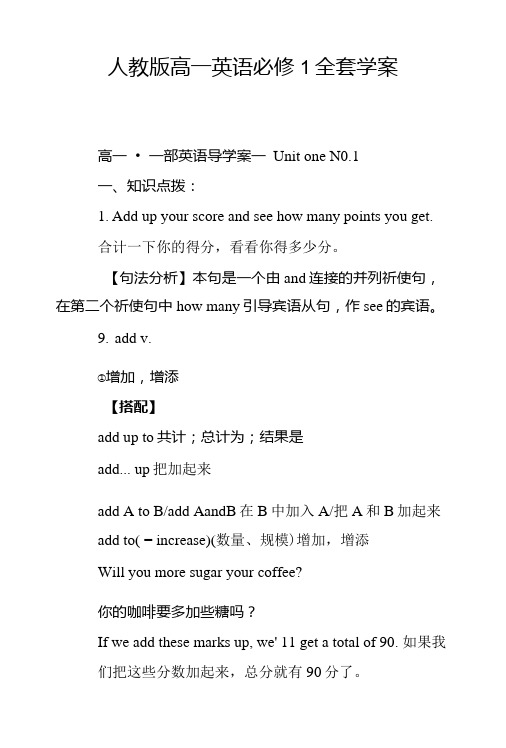高一unit one学案
高一英语(必修一) Unit 1学案

必修一-----Unit 1第一课时学案学习目标:掌握本单元的重点单词学习重点:重点词汇的基本用法学习难点:重点单词的拓展用法学习过程:自主学习为主,要求实验班同学必做,其他班级可以根据实际情况删减一、自主学习(一)边学习边完成下列问题1.upset adj./vt. ––2. v. 平静下来镇静下来adj.(人)镇静的;(海洋;天气等)平静的adv. n.3. v. 涉及;对……有影响;使挂念;使关心 n. 关怀;担忧4. 松的散装的5. n. 连续;系列单复数同形6.spellbind ––adj. 迷人的 adj. 入迷的7.darea. 动词. 无人称和数的变化只有时和时 dare/ /b.vt I wonder how he dares to say such wordsc.Don’t you dare!How dare you … I dare say8. adv. 在户外;在野外9. adj. 整个的;完全的;全部的10.vi.& vt. 捆扎;包装;打行李 n.小包;包裹11. vt.不理睬;忽视 n.愚昧→ adj. 无知的;粗鲁的12. vt.& n.(使)担忧;涉及;关系到;担心;关注;(利害)关系adj.关心的;有关的 prep. 关于13. vt.& vi.遭受;忍受;经历 n.痛苦;苦难14. adv.确实如此;正是;确切地 adj.确切的15. vi.不同意 n.不同意 v.(反义词)同意(二)学习困惑二、探究点拨答疑解惑思考回答下列问题:1. upset stomachIt upsets sb that It upsets sb sth 做sth 让sb不快nervous anxious upsetYour friend comes to school very upset. adj.2.辨析:calm (面对危险--- ) quiet (睡觉---- )still (照相--- ) silent (课堂上--- )3.concern oneself sb/sth 挂念T hat doesn’t concern us.I have no concern with it.He is said to have been concerned in itP lease don’t be concerned about itthe people 有关联的人 the expression 忧愁的表情辨析:concern anxietycare worryas far as I 依我之见4.I bought these cakes loose.5.A series of TV play on6.He rushed out of the room before I could say a wordI must write it down before forget itHe had hardly entered the room before he heard a loud noise before = whenIt be + +before …之后才…It will be 10 years before he comes back 表将来It be + + before …不久就…It wasn’t long before he told me about itI am willing to work myself to death before I give up 有表意愿词,意为7.辨析:because— as—Since— for—8.far/much —程度远远地大大地修饰very—by far--…得多The one is better by far She is by far the best三、总结升华四、高效训练S:新词基础强化练:1. such a heavy loss,the businessman didn't have the courage to go on.A.Having sufferedB.Having suffered fromC.SufferingD.Suffering from2.Please keep while I take a photograph of you.A.stillB.calmC.quietD.silent3.The man put down the phone with a long face,obviously about the information he received.A.contentB.amazedC.happyD.upset用calm,quiet,silent,still填空They moved to the countryside and lived a life.Children find it difficult to sit for very long.Although she was frightened,she answered in a voice.It's bad manners to keep when the teacher asks you a question.SS:新知旧知整合练:1.The workers risked their lives to restore communications in the disasterstricken areas,which were cut off________the powerful earthquake.A.in case of B.in spite of C.instead of D.because of2.I give him a piece of advice that he________a blue or grey suit to the interview.A.wears B.should wear C.wore D.will wear3.I am leaving my________position because I cannot show my capabilities fully here.A.present B.private C.individual D.personal4.Mr.Li,our teacher of English,talked with me face to face,which made me recognize________sillymistakes I had made.A.that B.what C.how D.which5.Not having a good________of English can be a serious obstacle to achieving your goals.A.demand B.appreciation C.experience D.commandSSS:备战高考模拟练:One of the greatest stories of rags to riches success is that of Andrew Carnegie,who started life in poverty but became one of the richest men in the world.Carnegie was born in Scotland in 1835,the son of a weaver.In 1848,the family moved to the United States and at 13 Carnegie began to work in a cotton mill,earning $1.5 per week.About three years later,he found a better job as a telegraph messenger boy.At work,his superiors(上级) were impressed by his abilities and willingness to work hard.In 1853,he gained an office job at the Pennsylvania Railroad Company.This was his first big break.He continued to impress and rose rapidly through the company,gaining_more_and_more_responsibility.At the same time,Carnegie loved reading very much and made use of every opportunity to visit the library.He read widely on all subjects,particularly literature.Carnegie now began to save a little money and,with the help of his employer,began to make some successful investments.He invested in the iron industry and eventually set up in business himself,owning several iron and steel plants.This was where he made his fortune.By the 1890s,the Carnegie Steel Company was the biggest and most profitable business in the world.Carnegie had always believed that the pursuit(追求) of wealth was never an end in itself.In his view,successful,wealthy people should redistribute their wealth for the benefit of everyone in society.True to his word,in 1901,at the age of 66,he retired from business and devoted the rest of his life to charity work.Carnegie's lack of formal education and his poor family background clearly didn't put barriers in the way of success.His rapid rise from poverty to wealth was due to his willingness to work hard,his intelligence and good business sense,and his talent for making things happen.He died in 1919 at the age of 83.1.What can be learnt from the text?A.Carnegie's employers had a high opinion of him.B.Carnegie made the investments independently after saving enough money.C.Carnegie believed that we should try to earn as much money as possible in our life. D.Carnegie could have been more successful if he had been formally educated.2.What does “gaining more and more responsibility” in the second paragra ph most probably mean? A.Becoming more and more intelligent.B.Being promoted to higher ranks.C.Having a better sense of confidence.D.Reading more and more books.3.When did Carnegie get his first big success in his life?A.When he took a job as a telegraph messenger boy.B.When he worked at the Pennsylvania Railroad Company.C.When he made investments in the iron industry.D.When he founded the Carnegie Steel Company.4.Which of the following will be the suitable title for the text?A.Andrew Carnegie:A Wealthy ManB.Steel & Iron:The Most Profitable BusinessC.From Rags to Riches:The Story of Andrew CarnegieD.Intelligence and Good Business Sense:Two Factors in Becoming Wealthy五、学习反思必修一-----Unit 1第二课时学案学习目标:掌握本单元的重点短语学习重点:重点短语的基本含义和用法学习难点:重点短语的拓展使用学习过程一、自主学习(一)边学习边完成下列问题1. 加相加2. 对…厌烦get /be tired doing / sth 因..而厌烦3.finish 结束做某事4.plan 计划做某事5. 度假6.pay / sth / sb sth 为(做)某事/某物支付某人7. 课后8.say no sb. 拒绝某人9. purpose 故意10.someone paper 别人的纸11. =have to 不得不12. 不必13. 经历经受浏览完成14. 放下;记下;登记15.grow/be crazy 对…痴迷拼命地It’s crazy sb 某人真是疯狂be crazy 疯狂/痴迷做某事16.have sth/ nothing 与…有关/无关辨析:do with ---用提问deal with ---用提问Meat was so expensive that we had to do with vegetables in those days“”—不用do without “ ”We can’t do without a telephone in our business17.have the power sth / doing sth 有能力做18.with复合结构:with+ +19.have some trouble/difficulty +n. (做)某事有困难have some trouble/difficulty doing sth 做某事有困难municate sb 交流communicate sth sb 转告21. 在黄昏时刻22. 面对面地23. 与某人相爱(二)学习困惑二、探究点拨答疑解惑思考回答下列问题:1. 合计add to = add that 包括2.情态动词+ have donea. have done 本该做而没做have done 本不该却做了b. have done 一定做过c. have done 过去或现在已经完成的否定推测不可能做过d. have done 疑问句可能做过…吗?e. have done 本愿做却没做f. have done 理应= have doneought have doneg. have done 本需而没做have done:没必要做却做了:没必要做实际也没做3. 动身出发延迟拨慢表着手做出发提出拨快开办创设竖起着手4.执政:不能胜任的:5.辨析:power- strength- force- ability- energy-6. 词短语:at the moment 此刻for a moment 一会for the moment 目前in a moment 一会后词:the moment7.辨析:fall in love 强调be in love 强调8.辨析:join join inattend take part in三、总结升华四、高效训练S:新词基础强化练:1.Add your scores up and we’ll see who won.These numbers add up to 100.Will you please add some milk to my coffee?2.It should have rained last night, for the ground is wet.He can’t have gone to Beijing, for I saw him in the room just now.There’s no light in the room, can they have gone out?He could have been ill, for he wasn’t at workI would have come yesterday.I needn’t have bought so much wine—only 5 people cameSS:新知旧知整合练:1.—Mike,this is for you.Happy birthday!—e in and have a seat.________.A.Make yourself at home B.Take it easyC.Don't mention it D.I'm happy to see it2.I've finished my essay,but I just need to_______it to check for spelling mistakes.A.go through B.go down C.go off D.go away3.—They_______have arrived already.—How can you be so sure?It's only a few minutes' ride.A.shouldn't B.mustn't C.may not D.can't4.By the time Mr.Smith arrives at the supermarket,we_______there for one hour.A.shall stay B.have stayedC.will have stayed D.have been staying5.—Remember the first time we met,Linda?—Of course I do.Y ou______as a volunteer during the Beijing Olympic Games.A.worked B.had worked C.were working D.would work6.In the yard was an old man telling stories,with quite a few children_______him.A.to surround B.surrounded C.surrounding D.being surrounded 7.—What do you think of the Chinese language today?—Quite popular.It________communicating with other countries.More and more foreign friends are learning Chinese now.A.plays an important role in B.gets along well withC.is based on D.is made use of8.I was about to give up when I_____a good idea.A.came about B.came out C.put up with D.came up with9.It is requested that the reporter________to blame for the wrong report.A.referring to B.referring to asC.referred to be D.referred to being10.The reason why she didn't accept the job was________she was offered a better position byanother company.A.because B.what C.which D.thatSSS:备战高考模拟练:1.In the evening the car broke down suddenly and the heavyrain the helplessness of the girl driver on thecountry road.A.resulted fromB.made upC.turned outD.added to2.I used to quarrel a lot with my parents,but now we fine.A.look outB.stay upC.carry onD.get along3.All these gifts must be mailed immediately in time for Christmas.A.in order to have receivedB.in order to receiveC.so as to be receivedD.so as to be receiving4.Mrs.Noland,who was born in a poor family, a lot of sufferings when she was still a child.A.went along withB.went back onC.went throughD.went into5.—Have you seen my notebook?—Oh,Jane must have taken it;she has the same one as yours.A.on purposeB.by chance C .by accident D.by mistake五、学习反思必修一-----Unit 1第三课时学案学习目标:掌握本单元的重点句型学习重点:本单元重点句型的用法学习难点:句型中涉及知识点的迁移用法学习过程一、自主学习(一)边学习边完成下列问题1. 做sth 无用do good to be good sb. / sth2.tell him/her that if the camera is broken again, he/she will have to pay to get it repaired.a.get / ask / tell O let /make O ----be madehave O 有/ 让b.get O3.Y our friend, who doesn’t work hard, asks you to help him/her cheat in the exam by looking at your paper cheat.a.v.cheat sb sth 骗sb sth cheat sb sb’s .money 骗钱cheat sb the belief that 骗sb 相信cheat sb doing sth 骗sb 做sthb.n.骗子It’s really a cheat.4.While walking the dog, you were careless.时间/条件/让步状语从句中,如果出现以下两种情况所列成分可省a. +b.5.Make a list of reasons why friends are important to you 从句语序reasona.n.a / the reason for sth / doing sth / to do sth句中用why / 句中用thatb.v.Man alone can reason.c.adj.His argument was well reasonedd.reason + 推理为reason sb. 规劝reason sb. doing sth 说服reason 想出答案等e.reason—reasoncause--- causeexcuse—excuse6.Why don’t you put the meat in the fridge?It will stay fresh for several days.stay:动词= 不用于7.It just so happened that I had met him beforea.=I happened to have met him beforeb.happen 正在做happen 做过8.It/This is/was time for sb sth /that +9.I am only able to look at nature through dirty curtains hanging before very dusty windowsa.hanging 修饰sth 常用b.nature大自然--前无本性本质-- 有10.I wonder if it's because I haven't been able to be outdoors for so long that I've grown so crazy about everythingto do with nature.注意:该句是含有的强调句,强调的是句子的原因状语because I haven't been able to beoutdoors。
高中英语Unit1SectionⅠReadingandThinking学案新人教版必修第一册(含答案

新教材适用高中英语学案新人教版必修第一册:UNIT 1 TEENAGE LIFE主题语境单元语法单元写作人与自我——青少年生活名词短语形容词短语副词短语建议信语言知识语音知识掌握al, ay, ai, ei, are, ar, er, ir, or, ur, ee, ea, ear,oa, ow, ou, ore, ere, eer, air字母组合的发音及其规律单词巧记movement, suitable, confusing, confused, obviously,responsibility, attraction, editor, survival,adventurous, generation, actually, addicted,greenhouse高频单词volunteer, debate, prefer, content, suitable,challenge, confusing, graduate, recommend, advanced,quit, responsible, prepare, schedule, practice,survival, expert, anxious, behaviour, attract,addicted, concentrate, since重点短语clean up, sign up, hand out, be/get used to, try outfor, focus on常用句式①动名词作主语②so that引导目的状语从句③it作形式主语和形式宾语④表原因的句型⑤too... to...句型⑥含有time的状语从句的引导词[导语]新学期对于每一个学生来说,都是一个挑战,特别是刚刚转到一所新学校的Joemar来说。
Like any new ninth-grader on the first day of school,Joemar Class had ninth-grader emotion(情绪). He's not used to school in Hartford. He's used to going to school in his hometown of Florida, used to seeing his friends, used to having class in Spanish.“Nervioso,”he said in Spanish.We first met Joemar in mid-October in the San Juan Airport. His father, Guillermo Class, had sold his car to buy plane tickets to get his kids and fly them up from Puerto Rico. The island was almost destroyed(毁坏) by the deadly storm—Hurricane(飓风) Maria.Now, they are settling into their new home in Hartford's South End. A week later, and, using his wife's car, Class drove 16-year-old Joemar to his first day at Bulkeley High School. After a short ride, he got out in front of his new school. Inside, he met Gretchen Levitz—the school's program director.“I see you have a new uniform,” Levitz said.“You look great. Are you ready for a good first day?”Then he met a couple of teachers.“Hello,”they each said in Spanish. They asked where he's from, and told him they were happy to see him. Then, Levitz took him on a quick tour of the school before classes began—to her office, the school store, the library, and the dining hall.A total of 19 languages are spoken in Bulkeley High School.“We have so many new students coming here from other countries every single day,”Levitz said.“So it's not like he's the only one who has that feeling.”“You could tell he's a little worried,”Guillermo said as we left.“B ut, at the same time, he's looking forward to it.”1.What kind of feeling did Joemar have on his first day of school? CA.Angry. B.Excited.C.Nervous. D.Relaxed.解析:推理判断题。
高一英语必修一unit1教案(优秀3篇)

高一英语必修一unit1教案(优秀3篇)高一英语必修一unit1教案篇一一、指导思想:新的学年,我将按照“规范教学管理,创新教学方式,突出教研重点,注重教研实效”工作思路展开各项教学工作。
针对我们班新生普遍英语底子差,基础薄薄弱的实际情况,老师们要坚持用“夯实基础,狠抓双基,使用导学案教法,改进学法,激发兴趣,提高能力”的指导思想来指导自己的工作。
主要教学内容:高一必修1、必修2(1-2模块)的内容。
二、具体安排:高一必修1及必修2(1-2模块)共8个模块,计划安排每一模块用10课时,新授8课时,练习2课时,共用4个月的时间。
三.具体措施:1.注意教学的承上启下为了使学生打牢基础不至于出现知识断层,本学期开学要重新学习音标,另外要有计划的把学生初中学过的但掌握不好的时态、句式、定语从句、状语从句、动词不定式以及部分掌握不好的词汇、短语、句型分插于12单元的新课教学中。
2、认真研究新课程标准要认真研读新课程标准,尤其与旧大纲不同的地方,认真研究新教材,采取用导学案的方法给学生上课,着重培养学生们独立自主的学习能力,培养小组合作精神,在集体备课的基础上认真备课、上课,认真进行自习辅导和批改作业。
4、听评课坚持教学研究和相互听课,探究如何听评课。
我要和其他教师互相学习,取长补短。
5、教案的书写本学期高一备课组要继续探讨如何规范书写教案。
备课组活动中将把教案细分,逐一探讨。
如:如何正确书写教学目标。
教学方法有哪些等等。
四.夯实基础1.听力从高一就开始就对学生进行听力训练。
每周坚持上听力课,另外每周至少两次利用课余时间给学生集体放听力,并鼓励学生课余时间多泛听。
2、单词单词一直是学生的难点、薄弱点,直接影响学生综合能力的提高,在教学中要重视词汇教学,狠抓单词的记忆与巩固以及对词汇的意义与用法的掌握。
使学生掌握科学的单词记忆方法和养成勤查词典的习惯。
3、阅读阅读理解能力的培养是高一教学的重点,也是高考的重头戏。
高一英语必修一第一单元教案精选5篇

高一英语必修一第一单元教案精选5篇高一英语必修一第一单元教案精选5篇作为一无名无私奉献的教育工作者,往往需要进行教案编写工作。
下面是小编为你准备的高一英语必修一第一单元教案,快来借鉴一下并自己写一篇与我们分享吧!高一英语必修一第一单元教案【篇1】一、课程目标高中英语新课程的总目标是使学生在义务教育阶段英语学习的基础上,进一步明确英语学习的目的,发展自主学习和合作学习的能力;形成有效的英语学习策略;培养学习的综合语言运用能力。
综合语言运用能力的形成建立在语言技能、语言知识、情感态度、学习策略和文化意识等素养整合发展的基础上。
语言技能和语言知识是综合语言运用能力的基础。
情感态度是影响学生学习和发展的重要因素。
学习策略是提高学习效率、发展自主学习能力的先决条件。
文化意识则是得体运用语言的保障。
高一年级(课标六级)英语课程目标:1.进一步增强英语学习动机,有较强的自主学习意识。
2.能理解口头或书面材料中表达的观点,并且能简单发表自己的见解。
3.能有效地使用口头或书面语言描述个人经历。
4.能在教师的帮助下策划、组织和实施英语学习活动。
5.能主动利用多种教育资源进行学习。
6.能初步对学习过程和结果进行自我评价,调整自己学习目标和策略。
7.能体会交际中所使用语言的文化内涵和背景。
高一年级(课标七级)英语课程目标:1.有明确和持续的学习动机和自主学习意识。
2.能就熟悉的话题交流信息,提出问题并且陈述自己的意见和建议。
3.能读懂供高中学生阅读的英文原著简写本及英语报刊。
4.具有初步的实用写作能力,例如:事务通知和邀请信等。
5.能在教师的指导下,主动参与计划、组织和实施语言实践活动。
6.能主动扩展和利用学习资源,从多渠道获取信息,并能利用所获得的信息进行清楚和有条理的表达。
7.具有较强的自我评价和自我调控能力,基本形成适合自己的学习策略。
8.理解交际中的文化差异,初步形成跨文化交际意识。
二、课程内容完成牛津英语第三第四模块的全部内容。
高一英语必修一unit1教案

高一英语必修一unit1教案高一英语必修一unit1教案「篇一」(1)课题:Earthquakes(2)教材分析与学生分析:本单元的主题是“地震”。
Warming Up部分Pre-Reading部分要求学生描述、讨论与地震有关的话题。
Reading部分是一篇新闻报道,介绍了唐山大地震前的预兆、地震造成的城市建筑和人畜损失以及地震后的救援情况。
Learning about Language部分涉及了本单元的词汇和语法。
该部分主要通过阅读和句型练习帮助学生学习单词、数字的表达法以及有that, which, who, whose引导的定语从句,培养学生的自主学习能力。
Using Language部分的“读写说(Reading, writing and speaking)”训练提供了一封信,要求学生阅读后写一篇大地震纪念公园落成仪式上的演讲稿,接着说一说唐山大地震纪念邮票。
随后的听力(Listening)是一位美国人以第一人称叙述他在1906年旧金山大地震中的可怕经历。
写作(Writing)部分训练学生如何写新闻报道,学会拟地定写作提纲。
(3)课时安排:The first period: Reading The second period: ReadingThe third period: Listening The forth Period:Grammar The fifth period: Extensive reading The sixth period: Summary (4)教学目标:①知识与技能:了解地震的成因、预兆,地震造成的损失,地震时的应急措施以及震后的救援;掌握和运用本单元出现的新词汇和短语以及数字的表达法;熟练运用that, which, who, whose引导的定语从句;学会写英文新闻报道,拟订写作提纲。
②过程与方法:在学习阅读部分时,可以根据教学的需要和教学班级的实际,从不同的角度设计目的明确的任务。
人教版高一英语必修一Unit1 单元学案

必修一unit one 必背学案1.go through 经历,遭受;检查They _____ _____ _______ too many wars.The customs men _____ ________ his suitcases.go ahead前进,去吧go by(时间)过去go against违反,违背go on继续1.set down写下,记下Every day the man ____ _____ the amount of the money he cost.set up建立,树立set out/off出发,动身set about开始,着手2.a series of 一连串的,一系列的这个学生总是问他老师一连串的问题。
The student always asks his teacher ___________________. series 单复同形,作主语时谓语动词根据series 单复数概念决定,不根据of 后的名词决定。
1. A series of lectures ___ scheduled.2. Two series of new stamps _____ come out.4.outdoors adv. 在户外,在野外虽然天气冷, 但孩子们仍在户外玩。
Though it is cold, the children are ___________________.5.on purpose 故意地The dog peed(撒尿)over the woman’s face ___ ________.6.so as to 只能用于句中in order to 可以用于句首或句中He runs every day _____ _____ _____ _____ weight.7.at dusk 在黄昏时刻8.face to face back to backHis boss is having a face-to-face talk with him.His boss is talking to him face to face.9.He is no longer a child.=He is not a child any longer.10.settle vt. 解决(问题);结束(争端)Both wanted to _____ problems.使(自己)安下心来;使宁静After the excitement, I tried to ______myself.vi. 安顿下来;平静下来She can’t _______ to work.定居下来The family has _______ in Canada.11.suffer from 常加具体的不幸或痛苦的名词(战争、灾害、疾病)译为:患有……; 受……折磨suffer sth 遭受痛苦, 遭受损失。
(高一英语教案)高一英语新教材第一单元教学设计_高一英语教案

高一英语新教材第一单元教学设计_高一英语教案/Unit 1 Good Friends省前中供应Teaching Aims And Demands:1. Learn and master the following words and expressions:argue solution classicalsorrow survive share cast deserted adventure scared…be fond of in order tohunt for care about…2. Review direct speech and indirect speech3. Train the students’ ability of speaking.4. Train the students’ ability of reading comprehension.Teaching Important Points:1. Everyday English:1) Talk about friends2) Practice talking about likes and dislikes3) Learn to make apologies2. The correct understanding of the passage3. Grammar: direct speech and indirect speechTeaching Difficult Points:Train the students’ ability of reading comprehensionTeaching Methods:1. Explanation to make the Ss understand the difficult languages in the passage.2. Fast reading to find out the general information in the text.3. Question and answer to help the students go through with the whole passage.Teaching Aids:1. tape recorder2. multimediaTeaching ProceduresSection 1Step1. Lead-in ( warm up)It’s the first time for you to leave your family to live all alone. And everything around you are strange, the strange school, the strange classmates, the strange teachers and so on. Most of you do not getused to the life here, especially some girls, they maybe cry at night, they miss their father, mother, sisters, brothers …, because they feel alone.[1][2][3][4]下一页。
人教版高一英语必修1全套学案.doc

人教版高一英语必修1全套学案高一• 一部英语导学案一Unit one N0.1一、知识点拨:1.Add up your score and see how many points you get.合计一下你的得分,看看你得多少分。
【句法分析】本句是一个由and连接的并列祈使句,在第二个祈使句中how many引导宾语从句,作see的宾语。
9.add v.①增加,增添【搭配】add up to共计;总计为;结果是add... up把加起来add A to B/add AandB在B中加入A/把A和B加起来add to( = increase)(数量、规模)增加,增添Will you more sugar your coffee?你的咖啡要多加些糖吗?If we add these marks up, we' 11 get a total of 90. 如果我们把这些分数加起来,总分就有90分了。
The snow storm added to our difficulties. 暴风雪增加了我们的困难。
语中)“ And don,t be late,she added・“还有,别迟到,”她补充说。
2.Your friend comes to school very upset•你的朋友来上学时心烦意乱。
lO.upsetadj. & vt・①adj.心烦意乱的;不愉快的【搭配】be upset about/over sth.为某事烦心,be upset that. ••心烦He was hombly upset over her illness・他为她的疾病而忧心忡忡i②vt使……不安;扰乱;推翻【搭配It upsets sb. that...ik某人心烦的是it upsets sb. to do sth•做某事使某人不愉快。
It_that nobody had bothered to tell him about it.让他不高兴的是,谁也没有把这件事告诉他。
- 1、下载文档前请自行甄别文档内容的完整性,平台不提供额外的编辑、内容补充、找答案等附加服务。
- 2、"仅部分预览"的文档,不可在线预览部分如存在完整性等问题,可反馈申请退款(可完整预览的文档不适用该条件!)。
- 3、如文档侵犯您的权益,请联系客服反馈,我们会尽快为您处理(人工客服工作时间:9:00-18:30)。
必修4 unit 1 学案王蕾1. specialist She is a specialist in agriculture.2.behave(1) behave (well/ badly) to /towards sb. vi. 行为, 举止, 举止适当或有礼她表现出了很大的勇气. She behaved with great courage.他对顾客的态度不好. He ____________ to (towards) the customers.你应该学会举止得体Y ou should ______________.(2) vt. (oneself) in a socially accepted or polite way 举止适当或有礼Please behave (yourselves), children.(3) n. behaviourTheir behaviour towards me shows that they don’t like me.She was ashamed of her child’s behaviour.3.. shaden. in the shade 在阴凉处shade 阴凉处,树荫;shadow 阴影,影子in the shade of 在…的阴影下v. shade… from 使免受…的照射Y ou should shade your eyes from the sun.4. move off 离开启程move out搬出去move away搬走Move about四处走动move on继续前进5. observe vt. & vi.①看到,观察到,注意到。
其后跟名词或代词。
如:Did you observe anything strange? 你注意到什么奇怪的事情了吗?也可跟复合结构,常用短语:observe sb. do / doing sth. 看到某人做了/正在做某事。
(用动词不定式作宾补或用动词-ing形式作宾补稍有不同:用动词不定式表示看到动作的全过程并且该动作已结束;用动词-ing形式表示看到动作正在进行。
)如:The policeman observed the man open / opening the window.警察看到那个人打开了/正在开窗户。
提示:在主动语态中,observe 后作宾补的动词不定式不带to,但在被动语态中要带to。
I observed him enter the bank with a gun. He was observed to hurry by.我看到他带着枪进了银行。
有人发现他匆忙路过。
②庆祝,庆贺。
如:Do they observe Christmas Day in that country?那个国家的人过圣诞节吗?③遵守,遵循。
如:Y ou should observe the local customs when you go abroad.到了国外,你应该遵循当地的风俗。
④observation n.①观察(力)(不可数)。
如:By his trained observation, the doctor knew that the man was not really dead.医生根据他训练有素的观察力,知道这个人并没有死。
②观察到的东西(可数)。
如:The doctor examined the patient and wrote down his observations.医生给病人做了检查,并将观察到的情况记了下来。
[小试] 根据汉语提示完成下列句子。
(1). He bought a telescope, through which he can ________ (观察星星).(2). Do you ________ (过愚人节) in China?(3). I felt he ________ (正注视着) everything I did.(4). As students, we must ________ (遵守校规) in the school.(5). That stranger was ________ (被看见进入了那所房子).6.argue[点拨] argue ①vi. 辩论,争论。
常用短语:⑴argue with sb. about / over sth. 就某事和某人辩论。
如:He often argued with his teacher about / over politics. 他经常和老师辩论政治问题。
⑵argue against 据理反对。
He argued against the plan. 他反对这个计划。
⑶argue for 为……辩护。
The lawyer argued for the poor man.那位律师为那位可怜的人辩护。
②vt. 争论,说服。
常用短语:argue sb. into / out of doing sth. 说服某人做/不做某事。
如:They argued the thing for hours. 他们就这件事情争论了几个小时。
He argued her into / out of making the decision. 他说服她做出/不要做出那个决定。
[拓展] argument n. 辩论,争论;论点,论据, 理由。
如:We had an argument with the waiter about the bill.我们和服务员就账单发生了争吵。
His argument was that public spending must be reduced.他的论点是公共开支必须缩减。
[小试] 根据汉语提示完成下列句子。
1. There was ________ (一场激烈的争论) over the matter.2. We ________ (说服她和我们一起参加了宴会).3. It is no use________ (与那个人争辩).4. The brothers ________ (总是为房子的事而争吵). 7. crowd in / into[寓词于境] 阅读下列句子,并观察crowd in / into在句中的意思。
1. The fans crowded in to see the pop star.2. Students managed to crowd into the bus.3. The memories of the childhood crowded into my mind / crowded in on me.[归纳总结] crowd in / into意为“涌入、挤进”(句1、句2);还可意为“(想法、问题等)涌上心头、涌入脑海”(句3),此时crowd in (on sb.) = crowd into sth.。
[拓展] crowd ... into ... 让……挤进、把……塞满。
如:Mother crowded all her child’s toys into the box.母亲把孩子所有的玩具塞进了那个箱子。
[即学即练] 翻译下列句子。
1. 人们涌入那个新超市去购物。
2. 往事一起涌上她的心头。
8. inspire sb. to do鼓励某人做某事His speech inspired us greatly.The teacher inspired us to make greater efforts.The memory of his childhood inspired his first novel.inspire 促成;赋予灵感inspired 有灵感的inspiring 激励人心的9. support[寓词于境] 阅读下列句子,注意support在句中的词性和意思。
1. If you bring it up at the meeting, I’l l support you.2. It is not fair to let Mary support the family.3. The chair won’t support his weight.4. The suggestion got much support.[归纳总结] support作动词时,意为“支持、拥护”(句1)、“养活”(句2)、“支撑”(句3);作名词时,意为“支持”(句4)。
[拓展] supporter n. 支持者、拥护者in support of 支持、证明。
如:He even made some experiments in support of his idea.他甚至做了一些实验来证明他的观点。
[即学即练] 用support的适当形式填空。
1. The president had lots of ______.2. He ______ the government in its plan to build more railway lines at the meeting yesterday.3. He is in trouble. He needs our ______.10.look round四处查看look after照顾look forward to盼望期望look into调查look on旁观look out 当心小心look through检查浏览审视look up查look up to尊敬11. refer to [寓词于境] 阅读下列句子,并观察refer to在句中的意思。
1. Did he refer to what had happened?2. Do not refer to me in your letter or in your speech.3. If you don’t know what this means, refer to the dictionary.4. He referred to his students as good friends.5. When I said some people are stupid I wasn’t referring to you.6. He referred his wealth to his hard work.[自我归纳] refer to意为_____ (句1、句2);_____ (句3);_____ (句4),常和as连用;_____(句5);还可意为“归功于、归因于”(句6)。
[即学即练] 从A、B、C、D四个选项中,选出最佳选项。
